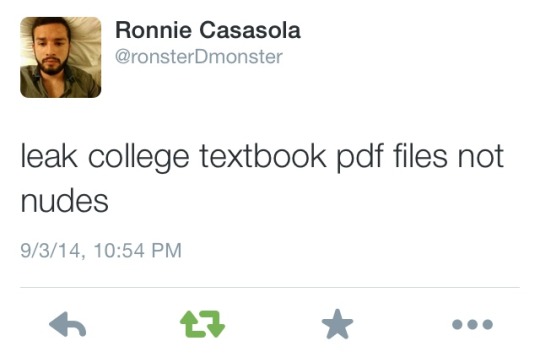Don't wanna be here? Send us removal request.
Text
"writing about fucked up things doesnt indicate your values as a person" and "the way you write about things may indicate some of your values" are not conflicting statements if im going to be real
40K notes
·
View notes
Note
I never thought about the possibility of Sukuna being left at a temple, but that makes a lot of sense. Personally, I also get the impression he tried to ingratiate himself to the aristocracy of the time, only to realize that no amount of poetry, archery, good taste, or acumen in any area would lead him to be seen as human. He'd always be treated like his worth was decided from birth, not by his choices.
So I think that's why he retains the preoccupation with poetry, and archery, and his knowledge of flowers he shows during the conversation with Yuji. But I think it's also why he then claims the knowledge of flowers only comes from Megumi. I think that he does, genuinely, like those things, but hates what they represent. They represent an attempt once made to change that was rejected by the human beings who stood at the top of his era's social order.
And I think in many ways, his belief in the hegemony of force could be a direct refutation of the way that Heian Era nobility embodied the pinnacle of a certain interpretation of humanity. Of class, of art, of wealth, of elegance - things originating with humanity. But the power to kill encompasses humanity and originates before and outside of humanity. I think Sukuna simultaneously prides himself on the elegance he's obtained while holding the people who once valued that elegance in disdain. I think he refuses to own his knowledge of nature and art around Yuji because he doesn't want to allow Yuji to sense humanity in them. He refuses to be empathized with.
One of the things I find the most interesting about Sukuna is that he rejects his own humanity, yet his humanity can't always be denied. It's seen in the way he still upholds the arts, like when he criticizes Yorozu for not including a seasonal word in her haiku, and it's seen in the way he extended a hand to Uraume. Even wielding the ultimate in lethal force, he couldn't kill the humanity within himself.
What do you think Sukuna's childhood was like? Do you have any headcanons?
I do! Let's start from his birth!
"A child spurned by the village will burn it down to feel its warmth." --African Proverb
Sukuna says his mother was starving while he and his twin were in the womb, and says he "ate" his twin so he wouldn't starve. My guess is he fused with his twin physically, and because twins are considered one person split across two bodies [in jujutsu], his soul won the battle to stay while Jin's returned to the cycle [more on this later].
As for when Sukuna was born, I think it was likely either deep winter or early spring depending on how far along his mother was when he became cognizant. It was likely during a time when crops, hunting, and fishing were scarce. Seeing his deformity at birth, his mother likely considered him a curse. I don't think she had it in her to leave her own baby to die in the wilderness, so I think she did the next best thing she could for her conscience, and gave him to a temple to become its ward. It was very much a Hunchback of Notre Dame situation, and it's not uncommon for religious institutions to take on abandoned or orphaned children as wards.
From here, I believe Sukuna was kept hidden and raised amongst monks and priests, and he likely came into his powers early. I don't think he was born evil, but I do think people's fear, apprehension, and disdain for his appearance became the curse that would eventually lead to his path of destruction through the ages.
Sukuna was fostered amongst the monks and priests, learning the very early foundations and principles of jujutsu. At first, things were good, but when one is blessed with so much power, it becomes easy to lose sight of where one started. I think at some point, Sukuna surpassed his teachers and sought more than a life of asceticism and prayer in the temple. He has all this power and yet he's expected to be ashamed and cower because of how he looks? Well then, he will give people a reason to avert their gaze.
And so it went. And I think his willingness to use his power to do violence ultimately led to him being expelled from the temple, and shunned by the monks who'd given him his foundational knowledge. By this time, I think he's an adolescent on the cusp of adulthood. Still young, dumb, and full of cum, but he's a prodigy in jujutsu and his technique is lethal in its entirety. He'll be fine. He leaves the temple smoldering in his wake, a testament to his new path.
And thus begins Sukuna's adventures as a bonafide curse user.
This is about all I can remember from my manic late night ramblings on Discord, anon, but I believe you get the gist of where my head is at with this guy.
16 notes
·
View notes
Text
I wish Kubo could just let me hate men and stop making men that I find attractive, he is making it really hard to be a violent misandrist
1 note
·
View note
Text
Not Toga doing the single most precious curtsy in history
Why are we made to feel pain
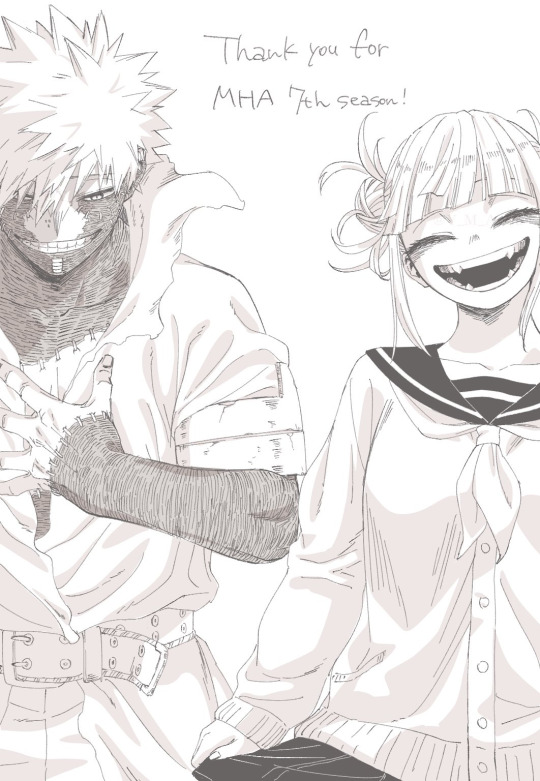
S7 end sketch by Anna Yamaguchi
#dabi#todoroki touya#toga himiko#bnha promo sketches#art by animation team#anna yamaguchi#my hero academia#boku no hero academia
1K notes
·
View notes
Text
Who was Tomura Shigaraki?
When this chapter came out my mind was still processing the shit show that Izuku/Tomura had been, and I honestly thought that anything that came after that would never improve it. In part I still think the same thing but that doesn't mean that this chapter is still something I can appreciate and sincerely wanted to write.
The chapter itself can be easily summarized in the vision of two perspectives, the first told from a documentary form about the consequences that Tomura and his LoV left on the citizens of Japan and the other Spinner's perspective.
The vision of the citizens is totally empty of empathy towards Tomura, the citizens have their perspective colored by their losses and their anger, from the loss of their home or the death.



Lack of empathy in general, considering him scary, someone who no matter how much past he had, it shouldn’t be justified or someone without convictions and only hunger for destruction.


I emphasize the dialogues because those who say them are irrelevant, since they are only citizens. The panel of the lack of convictions is the one that catches my attention the most, because we can see the ignorance of the people, for the external viewer who lived the emergence of the Lov and the war, for them are exactly monsters. Tomura has no convictions because they see the same thing as the hereos at the beginning a manchild, that's what Stain told him at the beginning that he only sought to destroy without reason, that he had no convictions, the same thing Izuku tells him in their talk at the mall, Midoriya tells him that his actions were childish and had no purpose beyond destroying as a childish enjoyment, that even without endorsing Stain's methods he still understood his motives, something that didn’t happen with Tomura. It’s after their talk that he comes out with his convictions and I think that is the point where we leave that more generic vision of manchild and his actions become something serious in the search for an objective, which solidifies in the formation of the LoV.
Likewise, what I’m trying to get at is precisely one of the perspectives that this chapter shows us, citizens don’t see beyond their own losses and feelings and above all things they judge a stranger in whom they’re not positively emotionally involved but only negatively. What this chapter shows is that it’s very easy to dehumanize what is unknown to us, "monster, terrifying, etc." It’s easy not to feel empathy for someone who has only given us negative emotions, even their past will not be justified.
What is interesting is that the documentary and the talk between Midoriya and Spinner are intertwined, we not see the perspective of the finished documentary and then Spinner, but documentary is interrupted by Spinner and it’s where we find someone that talks about Tomura with care and humanity, which the citizens’ reports lack. Also what we see in this chapter is Spinner's breakdown and Izuku's reaction to this, which is correct and helps Spinner to have closure.
For every thought from the citizens we have Spinner showing us that Tomura wasn’t destruction for meaningless childish joy, for every comment about his lack of convictions we have a Spinner who found a way thanks to Tomura's convictions, for every person who is unable to see anything outside of a terrorist, Spinner sees someone who gave him a place, a purpose and treated him as an equal when until then he seemed resigned to his destiny, he sees a friend. We can even see the smallest things that it was that Tomura loved video games.
Although it has been discussed whether the LoV stories justify their actions, the truth is that this chapter shows that even that person who seems monstrous has another identity, Tomura isn’t the symbol of fear for Spinner, but rather his first friend, someone precious, this contrast of perspectives is important because it shows us that there are no blacks and whites but a gray scale.
Having said the above, in addition to the perspectives and the confrontation between them in this chapter, I also want to focus on the emotional aspect, loss and grief. For this I think that the main panel between them is a good introduction.

The first words that come out of Spinner's mouth are to call Izuku a murderer and Midoriya's with absolute calm, says that he will not deny the fact, again despite my criticism of Horkoshi and that I think he was mediocre in the treatment of Izuku and Tomura, I’m not going to deny that these words have been haunting Izuku since their confrontation and outcome, Spinner may be the one who puts them on the table for the first time, but from the hospital we know that Izuku feels his failure. This is seen again when the only time a UA student, tells him that he’s an inspiration, his thoughts return to Spinner's gaze and he doesn't know what to respond, because he knows that the admiration he receives is due to the outcome with Tomura which is not what he wanted, to be recognized for taking a life.
However, there is also something I must say and that is that during all the final chapters Izuku prioritized the emotions of others over his own, which is why we have no reaction with Spinner. Some blogs I read said that Midoriya's reaction to this chapter had been incorrect, because more emotionality was needed and perhaps a deeper attempt at consolation. However, Midoriya consoled and listened to Spinner's pain and recognized it and above all he didn’t try to justify anything, this differs for example from his reaction to Toga's confession and with Dabi in the first war, with Spinner he takes his pain, listens to it and does not try to justify himself or make him see another perspective but simply remains stable and lets Spinner to be one who feels, the one who cries.
Izuku's consolation to Spinner is not to justify himself, to accept his pain but above all to carry the message, because there are no words that he can add that generate more comfort than those he said, there is nothing else he could say or do that would have given Spinner a minimum sense of peace than knowing that until the end the LoV was Shigaraki's driving force, that he remained firm until the end in keeping his word and that he wanted to be the hero of the villains, wanting to fulfill his promise to Spinner.

Midoriya's recognition of the league is important, because he doesn’t detract from them but rather recognizes them as a central point of Tomura, that child and then adult who was manipulated in every aspect, at the end of the day he had his own will when he formed the LoV and that is out of AFO's hands. At the end of the day they were his last thought, and this is very similar to what Ochako told Toga when she recognized that she could not replace the LoV as Toga's family, Ochako recognizes them as importance for Toga, and Izuku in turn recognizes this in Tomura and conveys this to Spinner, as Tomura said "Even if I become an empty shell and all my hatred fades away, I still want to be a hero for them".
In the same way he also consoles him in his final words by encouraging the book and says he will never forget Tomura, by recognizing these two things he is telling him that he should tell his vision knowing that he would not be in a good light from his perspective and above all when he assures that he will not forget him, he does not say it because of what he did to him or his friends, but as a response to tell Spinner that Tomura's life had value and that he will not be just one more on a list of villains, because those are Spinner's words, that for heroes like Midoriya he will only become one more name on a list but Izuku says that Tomura will accompany him always, that is why also after those words Spinner loses his defensive posture and allows himself a few words about Shoji.
All of this is about Midoriya, but we still need to touch on what Spinner said from his own perspective. The way he slowly begins to lose control of his emotions and tells himself that he must stop thinking because otherwise the pain would return. The way he talks about Tomura as his hope and his friend, someone who gave him acceptance and who little by little breaks a little more especially because he is not only angry with Izuku but with himself, because he blames himself and his inability to reach his friend when there was still time.


Spinner acknowledges that he let everything take its course, that if he had been a little more involved, that even if he had objected to Tomura's plans to merge with AFO, then he could have changed the outcome, Spinner was a bystander, who could have taken action. but he didn't, he feels like he failed his friend because there was a moment where he could have taken a step forward even if it meant confronting Tomura's own plans and then everything seemed impossible to stop to the point that the only thing left to do was move forward and take a quirk from AFO to continue with the plans. Spinner's feelings about both his loss and his own inaction become a central focus and the book becomes his way of ensuring that even a memory of Tomura and the LoV is not forgotten, because perhaps he failed to be there for Tomura. but he will make sure that people know the real Tomura Shigaraki, the one they call without convictions or simply as a monster, he will be in charge of telling who Tomura was, the person who gave him a place of belonging, who played with him and accepted him when he had already given up and couldn't find a place to fit. Maybe that won't change the perspective of citizens in general, but it's better than hundreds of strangers talking about someone they don't know. Ultimately it's the only thing Spinner can do for his friend, that at the end of the day people know that his convictions stood even to the bitter end. I didn't think I was going to write something so long, but honestly this chapter is one of the few things that I liked and I felt that all its aspects deserved an analysis or at least an attempt at analysis. I clarify that I didn’t use the official translation because Manga Plus in my region does not allow me to read a certain number of chapters, but I remember that the original translation does not differ grossly from the chapter to alter the interpretation.
#izuku midoriya#deku#midoriya izuku#spinner#shuichi iguchi#dabi#touya todoroki#ochako uraraka#toga himiko#shigaraki tomura#tomura shiragaki#tenko shimura#bnha#mha#my hero academia#boku no hero academia
74 notes
·
View notes
Text
My ultimate problem with the criticisms you make here is that you're complaining that the story isn't realistic or fair by demanding unrealistic expecations and special treatment. The whole world of HeroAca is unfair, and that's the whole point of the whole arc of the League of Villains. For its flaws, the story remained true to the theme that the world is unfair and we, the human race, need to work to make it fair, not just leave it up to fate.
Like you know why almost none of the heroes died? They had the entirety of society on their side. All the resources, everything. It is unfair because it is written to be unfair. Edgeshot can go to a state of the art hospital and have his condition stabilized by a team of doctors with specialized healing Quirks, and the villains don't.
None of this is meant to be read as the "happier ending." You act as if everyone's just going to be buddies and everything's fixed now, as if that's the tone of the story, when it isn't. It only looks that way if you can't read tone or subtext, which I'll be charitable and assume that you can't. If I assume that you can and wrote all this anyway, I have to assume that you're engaging in intellectual dishonesty.
This is a tragedy. All the important fights in the final arc were written as tragedies. Now, the aftermath is written as uncertain and frightening, with only the potential for hope if people change. Do I think Horikoshi could have done more? Probably, but to act like he's just treating this as sunshine and rainbows is misinformed at best and outright dishonest at worst.
All I have left to say is that it seems to me like your impression is that Horikoshi thinks this is right, that this - the condition of things in the story - is the way things should be. I'm going to do something that you could stand to learn to do for an author, and be charitable, and assume that you aren't stupid and aren't dishonest, but are in the throes of pain and disappointment. I would advise you don't criticize a work of fiction in that state. The reason it "feels good" is that you're just letting your emotions lead you around and you're not looking at things clearly. Go drink some water and recalibrate.
While the fate of the League is of course incredibly messed up, unfair, and infuriating; something that really grinds my gears is all the reactions to the League stans calling this unfairness out by going "well they had to die and deserved to, and they would have gone to prison otherwise anyway, it's not like there was any happy ending available for these horrible criminals," when, like...yes there was. They totally could have Vegeta'd it up in here; MHA is not a realistic series.
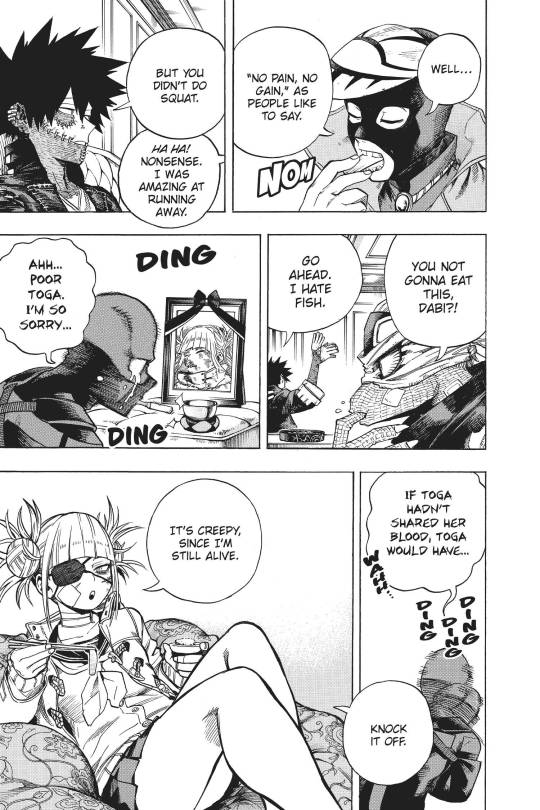
Like, Edgeshot survived using his own body to sew a guy's heart up by living as an eyeball with hair on a string.
Endeavor, the known horrible domestic abuser and outright rapist, is retiring publicly shamed (to an extent) but still to great wealth, recognition as a great hero, and with his entire free family having at least a positive opinion of the man.
And of course this latest chapter 429 implied that all those societal failings caused by the horrible MHA civilians neglecting or attacking people including children, the failings that created the League, the failings the League put their lives on the line to fix and utterly failed to fix because they all died completely ignored...got fixed anyway because Deku was so 'zomg inspirational' that suddenly the MHA civilians aren't horrible anymore. (Read in the tone of this video.)
In short, MHA is full of ridiculousness, injustice, and contrivance when Horikoshi wants a happier ending to occur.
But the League had to die because...because MHA is a deeply flawed story with bad writing and at best inconsistent morals. (And it kind of feels good to say that.) It wants at times to be realistic and even tragic, but it also wants to be optimistic and comic book-y to reward the heroes, and here at the end those elements do not mesh at all. It wrecks the whole thing to reveal that Hori might be kind of a hack.
#bnha#bnha 429#shigaraki tomura#toga himiko#dabi#spinner#league of villains#midoriya izuku#hero society#kohei horikoshi#boku no hero academia#my hero academia#my hero academia chapter 429#boku no hero academia chapter 429
310 notes
·
View notes
Text
Sometimes you try your hardest and don't get what you want. But sometime you still get something.
The Powerful Theme Behind BNHA’s Nuanced Ending
As I’m posting this we only have one more chapter of the manga and I don’t know how the ending is going to exactly play out, but I do know one thing. The deaths of Toga and Tenko were not in vain, and the author is still trying to give readers hope while also still maintaining some realism and bitter-sweetness in his messaging. Therefore, this is what I think Horikoshi is trying to tell his readers, especially the young people who have their whole lives ahead of them to make a difference on the world:
I see how this theme, the one that’s been built up throughout this manga yet simultaneously feels like it’s coming out of left field, is one of those themes that is a hard pill to swallow. Basically, no matter how hard we can try and push to do good and help others/make the world a better place, we’ll often fail again and again. A lot of bad things can happen, society can choose to remain apathetic, and it can seem like nothing’s ever gonna change because you just put all that hard work in towards the future for nothing. However, even if sometimes you can’t save everyone or society keeps trying to push issues under the rug, that doesn’t mean we should give up trying to fight for social issues we care about. We might never get to see the perfect world Deku and Urarak dream of, and Tenko and Toga may be gone, but their fight for a good and accepting world will someday be worth it cus their actions do have weight by showing that redemption is possible, even if no one has seen it except them. Young people like them just have to make sure to leave their mark so that others can follow.
My Hero Academia is about how we all can become the greatest hero, not by magically destroying the world’s problems and apathy overnight, but instead by continously reaching out a helping hand to people who might not initially seem like they want it.
#Bnha#Bnha meta#mha meta#mha#boku no hero academia#my hero academia#bnha spoilers#bnha analysis#class 1a#mha analysis#deku#uraraka ochako#ochako uraraka#izuku midoriya#midoriya izuku#shigaraki tomura#tomura shiragaki#toga himiko#himiko toga#tenko shimura#shimura tenko
271 notes
·
View notes
Text
My Hero Academia 429: Postponing Thoughts
To whom it concerns or whoever may find this post and care, I've got a lot of tortured, swirling emotions and complicated thoughts about the epilogue of My Hero Academia. I'm waiting until the very final chapter to assess everything, and I may wait even longer. Right now, my emotions are still too intense to make a reasoned judgment. I may give it a week or two to go back and parse what I really think with eyes unclouded.
0 notes
Text
Like I dunno man, Horikoshi might throw one hell of a curve ball, I hope he just totally psychs me out and Toga gets to live, but it looks like I and everyone else hoping Toga would survive are cooked
I am in pain, I am in so much pain in fact I can't even write my fanfics
Horikoshi got me, run or he'll get you too, he'll make you care about fictional characters and then he'll get you
1 note
·
View note
Text
Sometimes I think about the fact that Mirko's lost both arms and one of her legs and was still trying to find Shigaraki to kick his ass, and is probably going to just get prosthetics and get right back to hero work as soon as she can get out of the hospital
Like I wish I could have just a drop of that fighting spirit to get through every shitty day I've been having lately, like just one iota of the kind of determination it takes to get three limbs taken off and say "Fuck you, life, you didn't go for the head"
14 notes
·
View notes
Text
The way I see it is that Natsuo can see now that his father is changed, but it's just too late for that now. He's been hurt too badly by this family to go on. Getting his brother back only to watch him waste away in that life support tank would be too much.
Meanwhile, I think Rei never hated Enji, even though she had the right to hate him just as much as the rest of the family. I think she was always just sad, for what their family had become and what Enji had turned himself into. I think the point of that scene with the flowers he'd given her was that she knew tthere was still good in him, a good person somewhere inside of him that was being killed by his own shortsighted, prideful, horrible actions. I think she came to realize that sooner or later, Enji was going to be the one to suffer the most because of who he was and what he'd done, and I think she saw most of all just how sad all of it was.
For Rei, I think she just wants to help build up what good Enji can still do with his life. I think she wants to steer him towards doing good for others instead of tormenting himself. She has the right to want that.
For Natsuo, he's been too hurt and worn down to try anymore. If he doesn't get out, if he doesn't walk away, it's just going to grind him into dust. He has the right to walk away, too.
I don't think either Rei or Natsuo are in the wrong. Maybe someday when Endeavor is in his 70s and Natsuo's getting his first gray hair or something, he'll decide to let his grandkids meet their grandpa. Or maybe they'll slowly grow into happy lives without meeting again.
And so ends the tale of the Todoroki Family, a story where nobody gets what they really wanted and everyone is miserable, yet all still need to live on and try to make something worthwhile happen.
This chapter was kind of depressing. To see Todoroki's family all burned up was terrible. Also, the entire thing with Touya, Enji... it was expected, but something in the way it was made... it was so dry and tragic in a desolated way.
Also, I don't really get why suddenly Touya is apologizing to Shoto. He wasn't exactly repentant the last time we saw him. He being suddenly remorseful is kinda random, it's like they wrote that scene just because people wanted it.
I don't know why, but Natsuo saying he doesn't want to see Enji never and ever shocked me. I mean, he SAID it was a truce until they didn't bring back Touya, but I didn't realize he would never see him again after that. I imagined he would not forgive him, but I didn't think the family would be outright separated like that with Touya in hospital. It's also weird to match that declaration with Natsuo saying he thinks Enji did enough and was punished enough and should move on... like, whut. Is that the way of the plot to tell us a reconciliation is possible after all, or Natsuo is just uncomfortable with the idea Enji keep to punish himself after he cut up him from his life?
Weird for weird, it's weird also the fact Rei and Enji seem to be together again. I got they resolved to be there for Touya as parents, so they have to plan and work together... but it's weird to see her staying with Endeavor while the children go for their way, when Enji built the house for the entire family to be without him. I suppose that project crumbled too, like all Enji's projects for his family.
The kids just have to go and create their own life independent from their parents, and stop to think they eventually will be a big happy family, even with one or two members missing. That ship sailed.
I suppose Rei and Enji being together and separated from their children in that scene it is to remark the responsibility of both of them in the family they created (the kids can move on, they are not supposed to do that).
And Rei picking Endeavor's phone with Hawks messages make almost to think she is there just because Keigo couldn't be there.
But how much messed up is that the people who Rei said smugly are watching over them... are all people who are there because they are friends with Endeavor? Hawks, his sidekicks... behold, his TRUE family. Enji is not alone, but what about Rei? That woman has NO friends. It's tragic but beside her children (who are her "victims" too, in a way, so she can't burden them), her only emotional link in all this is Enji himself. I got they couldn't exactly to pull a supportive family and friends from the hat for her NOW, it still sucks for her, at this point let her to have the children, even thinking is not their work to comfort the parent.
I thought the family would stay together, even brittle and broke like it is, to watch over Touya. It doesn't look like that now, they won't work on it together. Endeavor is supposed to face it "alone", with the support of his circle of hero friends... and Rei, who looks SO out of place. It MAKE SENSE for her being there, but it would make more sense with the rest of the family there too. To play the route "it's time for your kids to care about yourself" makes sense on a side, it's weird on the other.
And I should really pickup that from the beginning of the chapter, with all the "you should not be there" bouncing around.
49 notes
·
View notes
Text
No, Ochako is not the worst female character in history, that's dumb
I mean what I said. The amount of hate Ochako gets is frankly stupid.
“Oh, buh buh buh, but she didn’t beat Bakugo at the Sports Festival — “ Yeah, and it wasn’t because Ochako’s a girl and Bakugo’s a guy, it’s because Bakugo’s the ace of the whole class. Like it really is just down to Bakugo or Todoroki, and Bakugo beat Todoroki at the Sports Festival. Put Iida in the ring with Bakugo and he’d go down just as hard. Midoriya lost to Bakugo when they fought after the Hero License Exams, and at the time of the Sports Festival, Midoriya didn’t even have Full Cowling.
Like people who claim Horikoshi made Ochako lose because he’s a misogynist need to pull their heads out of their asses and remember that Bakugo is the best combatant in the class that teaches kids to be superheroes and fight crime. Even he acknowledges that if he didn’t take the fight as seriously as he did, Ochako could have taken it.
Do you actually remember that, or are you so cornfed off of social media that your brain’s rotted through the bottom of your skull? The whole crowd is jeering at Bakugo because he didn’t let the cute girl win. He took Ochako seriously as an opponent and showed respect to her by not holding back. To have done otherwise would have been to dismiss her conviction and all the hard work she’d been putting in alongside everyone else. They’re classmates, but they’re competing with each other, too. And it would have been embarrassing to win because the ace of the class took pity on you and folded. Those people who were saying Bakugo should have won were the ones being sexist, because they weren’t taking Ochako seriously. All they saw was a cute face and thought she should get to coast by without being challenged, and that’s sexism.
How about the fact that Ochako’s motivation is to earn money so she can take care of her parents? Like a fundamental part of character writing is to give female characters motivations outside of those originating from their male counterparts. Ochako wants to give back to her parents and is willing to work her ass off to do it. But that never gets brought up.
Or how about the amount of personality she shows? People try to reduce Ochako to some flower on the wall girly-girl even though that’s never been the whole story. Yeah, she has a lot of femininity, she likes pink things. She’s also so used to being poor that she almost seems to take pride in how much she can endure living on a budget, and gets completely blown away at seeing how rich people (or people with a middle class income) get to live. And she’s also a weirdo who talks about “The fated battle between men” or gets hyper pumped up to the point it’s kind of intimidating, about the Sports Festival and after learning self-defense under Gunhead.
And yeah, it’s convenient how often people forget the fact that she identified her weakness in close combat after fighting Bakugo and specifically started learning self-defense martial arts in order to make up for that weakness. She repeatedly uses techniques for safely disarming knife wielding opponents and using judo throws to drop people throughout her appearances in the rest of the series.
People will say, “Oh, but after that, all she cares about is Deku!” No it isn’t, you moron! After Night Eye dies, she’s wracked with guilt, feeling like she should have done more to rescue him. She’s extremely motivated to use her Quirk to rescue people during that portion of the Hero License Exams, since she realized how much good she can do with it, and she continues to apply that during the kickoff to the war arc when the city was left in ruins from Shigaraki and Gigantomachia’s rampage. After Class 1-A brings Deku home to U.A. and Ochako quells the crowd, her arc becomes dominated by atoning for how she rejected Toga without listening to her and putting active compassion into practice.
I believe with all my heart in the supremacy of Togachako, but you know what? Acting like it’s insidious and harmful to depict a girl liking a boy is stupid. Do I want more same-sex pairings? More than you’ll ever know. However, acting like Ochako’s a failure of a character because there’s a boy she likes is stupid. You’re stupid if you believe in that.
And as a matter of fact, I’ll do you one better. Not only does the romance subplot not ruin Ochako’s character, it’s a really well-handled one. Deku ends up getting puppy love when they first meet because he’s a reclusive nerd who’s never talked to a girl outside of “Hey, you, move” and he’s overwhelmed. Then he saves Ochako (and Ochako saves him) during the entrance exam, and going into the Sports Festival, he sees the conviction she has and his very immature, superficial crush grows into one that’s much more informed and based on respect.
This goes both ways. Ochako starts out just seeing Deku as a friend, but after seeing how hard he tries in everything he does, she starts to admire him. Little by little, by and by, this grows into affection and into love. He inspires her to try harder, and she inspires him, too. They start to bring out the best in each other even though they’re a couple of dorks who struggle to open up about these things to each other.
If you call this bad romance writing, then you don’t understand how to write romance. It’s all about the reasons why characters are drawn together, seeing them develop in parallel. All that’s missing is actually getting to see them in a developing relationship, and that’s a problem, yeah, but it’s a problem in 90% of every romance manga. You never get to see the relationship, only the will they-won’t they until the relationship is formed right at the ending.
You wanna see a real shitter of a romance subplot? Here, I’ll show you how to write a real shitter of a romance subplot.
First step, be Masashi Kishimoto. Next, write a female character who only has eyes for her love interest because he’s handsome and have her love interest not even acknowledge her. Have the female character say something stupid and hurtful about another character, then have her love interest express open animosity towards her for saying that. Have her just spin her wheels in the background for a hundred chapters while the men fight, make some half-assed attempts at putting her on equal footing that never amount to anything, have her love interest literally fucking try to kill her and never even apologize for it, have her be obsessed with getting him back anyway, have her tell the main character who’s actually into her that she loves him when she actually doesn’t and is just going through what a middle aged Japanese man thinks women go through in situations like this, and then reward her with getting married to the guy who tried to murder her and never apologized, and then have it turn out that he’s never around for her or her daughter and she just stays at home hoping he’ll come in to acknowledge his own family exists.
Thanks for letting me get that out of my system!
5 notes
·
View notes
Text
An Incomplete Analysis of the Sukunadome
I stress the point that this is an inherently incomplete analysis. It's getting late, I'm tired and unhappy, and… well, the fight isn't over yet, so there's no way this analysis could be complete even if I felt like it. However, it's on my mind, and I feel the need to start exerting myself more on these things. Sometimes sweat is the better medicine. I know this is a long one and doesn’t have any pictures, but if we all support each other, we’ll get through it together.
Full disclosure, I wish more people had gotten filtered by this fight and just stopped talking about Jujutsu Kaisen by now. Like yeah, I think it's great different people see things in different ways, but let's all be honest with ourselves here, most of the people criticizing this fight are not doing so with any sort of literary or artistic perspective or good faith. Most of it is Gojo fans who are still crying, seething, vomiting, pissing, and shitting over the fact that the character they attached their ego to didn't win Jujutsu Kaisen like they wanted. If this describes you, well, this post will probably do you some good, but I'm confident nobody who takes the stance that Gojo should have won would have the space in their mind for what I'm about to say about Sukunadome.
Because that's what I'm calling it. "The Sukuna Cycle" was maybe a little funny for a week or two, but like most memes about this series, it wasn't really based on the story so much as it was on an agenda. Kusakabe was part of the fight since Yuji and Higuruma entered, and up until Miguel, we knew all the combatants who would be tagging in were there. We knew Yuta was off dealing with Kenjaku and would return, we knew Maki was in play, and there really weren't a lot of switches. Just Choso leaving and coming back, Ui Ui retrieving Higuruma's and Gojo's corpses, and… you know, actually, I think that's it. Sure isn't as much as the "Sukuna Cycle" memes made it out to be, huh?
Okay, if you haven't noticed yet, I'm a big JJK fan and a big JJK fandom hater. I think JJK has the worst Western internet fanbase I've seen in a long time, with only a few oases scattered across the internet where you can find intelligent life. Like it's insane what kind of bullshit a person can convince themselves of.
However, I'm not analyzing JJK's fanbase, I'm analyzing JJK. Someday we'll litigate whether or not Lobotomy Kaisen was really funny enough to justify how badly it ruined this fanbase's ability to objectively, productively engage with with one of the most competently written and culturally impactful manga to come out this century. Today is not that day.
So Sukuna's got four arms and knows how to use them. He's got four eyes and so much sass one mouth wasn't enough for the amount of trash he's got to talk to the youths of today. Just on a basic level, having four arms would be such an insignificant power in any other Shonen as to almost be a joke. Yet with how jujutsu sorcery functions as a power system and how adept Sukuna is at using every possible advantage at his disposal - even going so far as to take what probably should be disadvantages and twist them to work for him - having the ability to make hand seals while fighting hand-to-hand, and being able to chant without interrupting his breathing, are inseparable from Sukuna's godlike fighting ability. I love how something seemingly so mundane is such a huge x factor for Sukuna.
We continually see how Sukuna is a complex, but fundamentally vile antagonist. He has a very rich, detailed view of the world, but one that fundamentally reduces every other human being to be his playthings and food. It's just that Sukuna says, "Don't like it? Then get stronger." It's a very Social Darwinist, late stage capitalist view to be coming from the Heian Era, and I think that maybe it's intentional. Shitty people are shitty in mostly the same ways, it's just they find new things to be shitty about or to use to be shitty with.
Like if that were all it is, it'd make Sukuna so effective as a villain to hate and would slot so nicely into Jujutsu Kaisen's overarching social and political commentary. Cruelty within suffering, selfishness as a strength and a weakness, the unfairness of how the strength to pursue one's agency is unevenly distributed and how the haves don’t realize how easily they could have instead been have-nots, it's all there.
But there’s this inherent charisma to Sukuna that I think is intentional. He has this noblesse oblige where he’s so inherently aware of his greatness that he doesn’t have a problem with giving credit where credit is due. Like he talks all the trash when he’s fighting Jogo, but where Gojo’s insults come across as puerile and blunt, Sukuna’s always displaying this wit to him. And when the battle’s over, he acknowledges that even though Jogo wasn’t as strong as him, he was stronger than most and could have gone even further if he hadn’t held himself back. He starts off belittling Gojo in their fight, but by the end, he expresses a profound respect and gratitude towards Gojo. Like it’s a very warped form of those sentiments, but I think it’s sincere. Even with Ishigori, when Sukuna fails to cut him the first time, he just acknowledges it was disrespectful to hold back and that he’ll give it full force the next strike.
Something to keep in mind is that everything Megumi warned Yuji about when it comes to ancient sorcerers applies to Sukuna as well. They’re not treated as uniformly, unambiguously evil anymore than anyone else in JJK is, and are acknowledged as having fundamentally different world views about violence and the value of human life. Kashimo, for instance, seems to value his life only because he’s able to risk his life and lay it on the line. They’re people from an era where children died so young that parents often gave them numbered names so as to not get too attached until they’d see if their kids actually were going to make it or not. If you didn’t give your whole life over to a goal, you probably wouldn’t achieve it. Whereas modern sorcerers, modern people, have all these complex and sometimes contradictory views and needs, ancient sorcerers show a tendency to shave everything away except their one singular conviction because that was what you had to do in an era of much shorter life expectancies and peril on all sides. You’d be very lucky to accomplish one life goal, let alone as many as people of today set out to achieve: graduating high school, graduating college, getting a job, starting a family, and hopefully having one or two passions on the side. Fundamentally different worldviews from fundamentally different periods of history.
And Sukuna is no different. His goal is simple: partake in the many colors and flavors of humanity through mortal combat in the arena of sorcery. Sukuna’s love for sorcery runs deep. He’s always curious about different cursed techniques, even ones that are pedestrian to a sorcerer of his level, like Nanako’s smartphone-based technique. He reminds me of a quote from Baki: “Someone who works hard can never beat someone who enjoys himself.” Sukuna has clearly put forth great effort to master sorcery, but clearly doesn’t see it as work. He sees it as just doing what he enjoys and is good at.
Unfortunately for everyone else, he enjoys killing and is extremely good at it. Sukuna is the ultimate ethical heat death of the “live for yourself, cherish your own agency, don’t let yourself be controlled” mindset that is the ideological starting point of JJK. It’s a very dark, extreme interpretation of Buddhist non-attachment, where even compassion is an attachment to ultimately shed. Sukuna lives perfectly freely, including being free from guilt or compassion.
Naturally, there’s an exception. All things seem to have exceptions. In Sukuna’s case, that would be Uraume. I’ve been fascinated by their dynamic since we first learned of Uraume’s allegiance to Sukuna during Shibuya and I still can’t wait to know more. Suffice to say, Sukuna dotes on Uraume, forgiving their mistakes and seeming to enjoy their company not just because of their service to him, but because their existence makes him happy. I’m reminded of Power in Chainsaw Man, how she was seemingly incapable of empathy or mercy until she met Meowy.
Honestly, Sukuna reminds me a lot of a lot of characters in Chainsaw Man. People who are trying to climb from this state of misery, of struggling just to meet basic desires, and learning to be human. Yet Sukuna is so strong he never needed to learn to be human. He never needed to cooperate with others to survive — or at least, doesn’t seem to believe he did — and so he never saw the value in it. And so he’s basically brute forced his way around having to undergo an arc like Denji’s, and has instead ended up a hedonistic black hole devising all these complicated philosophical arguments to justify what is, really, a very simplistic, predatory desire to only satisfy his basic material wants and creative interests and nothing else for anyone else.
But like, it’s not that simple. If you give to others, you get something immaterial in return. I can’t quantity it or define it, but I’m sure most of you know what I mean. The happiness that comes from taking care of others’ needs, and the deeper levels beyond that happiness. Like I do believe that’s the subtext behind Binding Vows as metaphor: that you almost never give without getting in return. You might not get the same thing back, in the same form, but being changed by the act of putting the needs and wants of others before your own even temporarily still is part of the exchange. It’s part of becoming complete as a human being.
Sukuna has defied that exchange and broken the cycle, and I don’t think it’s inherently for his own benefit. There are some thing about being human that you don’t just get to opt out of, no matter how much you claim you’re more than or less than human. Even if Sukuna doesn’t think he’s lost something of value, he has. And that something of value is inherent to the whole point of this final battle.
Jujutsu Kaisen is basically working on two big problems. There are lots of ideas at play in the series, but there are two fundamental problems for which every fiight, every character arc, every turn of the gears consitutes part of the calculus to solve one or both of those problems.
The first problem, a thematic and philosophical one: “How do you love and fight for something when you know you’re going to die?”
The second problem, a metatextual one: “Is there any artistic and social value left in the Shonen formula as it stands in the modern day?”
And this fight is, ultimately, where GeGe is showing their work. It’s where Yuji has to defeat Sukuna, if not in terms of out-boxing him, then in terms of prevailing over his beliefs about humanity and the world as a whole.
GeGe has stripped Yuji of everything that is supposed to determine the worth of a Shonen protagonist’s victory. He’s not fighting alone, he didn’t go off and train all by himself, he trained with a lot of powerful, smart people who helped him. And Yuji is arguably not even the most important participant in the fight. So why should we care if Yuji wins?
The answer is so simple it’s easy to lose track of it. Yuji is risking his life to rescue someone, his friend, from being exploited, and to save the people of Japan from being exploited. Even after everything that’s happened, Yuji plants his fucking feet and takes a stance that no, shithead, there is such a thing as the right thing. Maybe it isn’t obvious all the time, and it sure as hell isn’t always easy to know what it is, but he knows now with certainty what it isn’t: to exploit others or to destroy yourself. We can find our answers somewhere in-between.
Sometimes we can’t resolve our problems with a tidy solution that makes everyone happy and sometimes we have to carve a piece of ourselves out and give to something we won’t be sure to see the fruition of, but that’s just life. It doesn’t mean we have to throw away all hope for things to get better. Even if the world won’t become utopian, it can still become better, no matter how many nihilists hide their own inequities behind assertions that there is no point.
Nihilism is not a solution to the problems of life, it is the choice to run away and hide. To give into nihilism is to give up the fight even while other people are still fighting all around you.
So that’s the fucking point of the Sukunadome. Nobara already said it better than anyone else has before she made Mahito look like the bitch he was and always will be: “Sometimes you need to fight even when you know you can’t win.” Because you won’t always win and you won’t escape death, nor will you know what lies beyond death. However, you can still live according to your principles and fight for the things you see as meaningful even if other people don’t.
That is why so many characters have come and gone from the fight. All gave some, some gave all. Nobody is truly useless — even if Miwa self-deprecatingly jokes about being useless, she still was the one thing standing between Maki and Malevolent Shrine’s eviscerating hellscape. Even Amai’s sweets-conjuring joke technique saved Hana from a would-be fatal fall and helped to supply sugar to the brains of people using reverse cursed technique in Shoko’s triage. Larue couldn’t do much, but they caught Sukuna’s eye at the perfect time for Yuji to land a Black Flash, and that means something. It all means something.
Given how deeply GeGe clearly respects Hunter X Hunter, I want to end off by citing one of the quotes in Hunter X Hunter that has been the most impactful for me and I suspect has been about as impactful on GeGe: “It seems small things… infinitesimally small things… are needed to build the entire universe. The size of a thing has nothing to do with its power.” We always seem to direct our senses to the superlatives. The largest, the oldest, the loudest, the things that hit the hardest. But while it would be wrong to throw those out, we often lose sight of how many little, important things there are in the midst of those huge, important things.
Seeing someone’s smile when you remembered something they said that showed you were listening to them. The feeling of a warm breeze on a summer morning. The smell of honeysuckle on your walk home. Waking up to rain on a Sunday. The taste of watermelon. Getting married. Having your heart broken. Songs that make you smile, songs that make you cry — songs that do both, and songs that make you feel things you can’t describe. When you’re always looking to those immense, monolithic things, always comparing your seemingly small, seemingley meaningless life to them, you lose sight of just how meaningful all of it is.
Just because it doesn’t have cosmic, absolute meaning doesn’t make it meaningless. Every little thing that means something to you is worthy of being cherished. The people around you, the things that bring you happiness, even if that happiness is going to ebb and flow. It’s all worth fighting for and living for. It just takes bravery and conviction to keep fighting and keep living with authenticity and love. And if there’s an artistic value, a greater meaning to Shonen, now and always, it’s the unerring, unabashed belief that there’s a reason to aim high and not give up.
Because sometimes, life hurts. But if it’s just pain, Yuji Itadori will never stop. We’ll see what I have to amend, reconsider, or elaborate on when the fight is finished. I hope this gave some of you a new way to look at it.
#jujutsu kaisen#jjk meta#jjk manga spoilers#jjk analysis#sukuna#ryomen sukuna#yuji itadori#akutami gege#the sukunadome#beyond sukunadome#pray for the jjk fandom
46 notes
·
View notes
Text
I was onboard with you up until the point you said that Gojo wasn't encouraging his students to be free thinkers. I get that you're trying to avoid painting over Gojo's whole character as some tragic victim, but I think you've ended up smashing down all of his characterization and oversimplifying what he represents in a different way.
By no means was Gojo a perfect person in general or teacher specifically, but saying he was just raising "stronger child soldiers" is an extremely myopic and uncharitable interpretation. He was the one who was pushing to defend Yuji because, no matter the pragmatics of it, a teenage boy doesn't deserve to be executed. Gojo seeded the baseball event for the second day of the Goodwill Event and pushed to not have it cancelled after the attack specifically because he believed that the events of youth should never be taken away from the young. His whole speech to Megumi was about telling Megumi to be more invested in his own life, to specifically not reduce himself to a cog in the machine and to not just build up other people at his own expense all the time.
You claiming Gojo doesn't even comprehend that he's a victim is also just extremely misguided. It's not as if he's just blindly aiding and abetting the system. The whole point of Hidden Inventory and Premature Death was Gojo coming to realize he was the benefactor of a system that was going to destroy him and the people he cared for eventually. Like the entire complexity of Gojo's character is that he's simultaneously a revolutionary against the system and an emblem of the system. He can only do what he does because the system warps and bends around him, but he chooses to use that to try and change the system.
These characters are all much more complex than I think you're making them out to be, and the answers aren't neat and tidy binaries of right or wrong. Like no matter how traumatic it is, Yuta had a point. What if there comes a time when someone has to shoulder an incredible burden - one that tests their strength and threatens their own inherent beliefs - or else everything they've been fighting for will come to nothing? Gojo was fighting for so long to prevent his students from making those kinds of decisions, but with him gone now, he can't protect them anymore.
Personally, I think that Yuta made a mistake. However, I think there were no good choices here. Like it is morally repugnant, it goes against Yuta's personal beliefs and against his responsibility to Gojo's memory, and that's the point. Because the story is positing the question: "Is this what needs to be done for the greater good?" I don't think we're going to get a clear cut answer, and I think that's the point.
I think it's good to be questioning these characters, but you need to look at the sum total of the story so far. You left out a lot of extremely important details that really over-simplified Gojo's character. I don't like the people that worship Gojo, but going to the other extreme isn't the way to see things clearly, either.
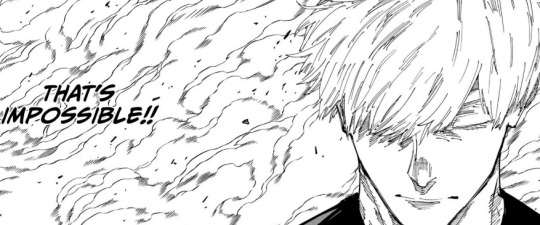
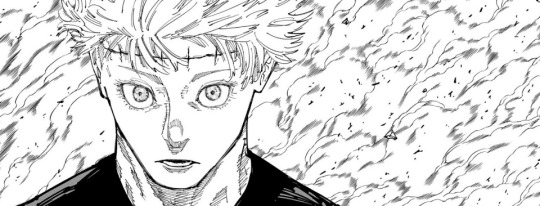
The Next Gojo Satoru
As you've probably guessed I have a lot to say about this chapter. However, right away I want to start out by pointing out once again that the fandom is taking a mostly gojo-centric view of this chapter. Which I understand it's Gojo's body that's being puppeteered around and dehumanized in the exact same way that Kenjaku one of the sickest and most inhuman characters used Geto's body.
However I think it shouldn't be understated how shocking it is to see Yuta betray all of his values like this. The most human character who represents love in the cast has given up on the cast and betrayed someone he loves. So let's talk about what this all means for Yuta under the cut.
GOJO GETS AN F IN TEACHING.
I understand why most of the focus is on Gojo, because yes Gojo's body is the one being violated here. He's not even allowed to rest in death after fighting on the front lines against Sukuna to the point where his brain was hemmoraging in the middle of battle and he was brutally cut in half.
Considering how much horror Gojo experienced when he saw Geto's body taken from him and made into Kenjaku's pupet. Cosidering the horrible pain that Nanako and Mimiko endured just seeing Geto's body still moving around denied a good death (Nanako and Mimiko were tellingly willing to let go and not try to take revenge against Gojo for killing Geto because of their friendship even though Geto was their whole world, but they'd never forgive Kenjaku for taking his body). Considering that Gojo even went out of his way to say he wanted to kill Kenjaku / Geto on Christmas Eve again in order to give him a proper burial it's understandable how horrifying this update is.
This is also a series where the two main antagonists are parasites who take the bodies, and steal away all bodily autonomy from characters like Yuji and Megumi and then force them to do horrible things they would never do and bear witness to it, such as the slaughter at Shibuya, or the murder of Tsumiki at Megkuna's hands.
It's understandable how people had such a visceral reaction to this chapter. However, I think the fandom has a tendency to paint Gojo like he's the central victim of all of Jujutsu Society when he's both victim and perpetrator.
Gojo is someone who has only been regarded as the strongest his entire life, and been used as a tool to keep Jujutsu Society stable his entire life. Gojo is also someone who never tried to be anything other than the strongest, never tried to empathize with anyone other than those who were just as strong as he is, and who raised all of his students to be tools too.
To illustrate my point here's an incredibly similiar character from Tokyo Ghoul: Arima Kishou. They are so similiar that they're both white haired mentor characters to the protagonist, they're both the strogest in their respective worlds, and Gege straight up copied this section of panels from the Tokyo Ghoul Manga.
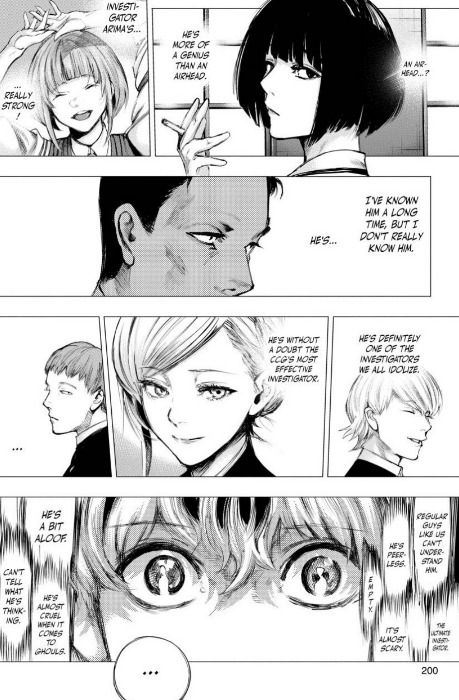
Arima is a breeding project, who was bred by the Washuu Family who mxies blood between humans and ghouls through a series of controlled marriages for the purpose of creating hybrid ghoul human children. Arima isn't the ideal hybrid they were looking for, but he was so ungodly talented he quickly rose to being the most powerful and well-respected investigator in the CCG.
However, this is how Arima reacts to the fact that his entire purpose in life was just to be a weapon to kill ghouls.
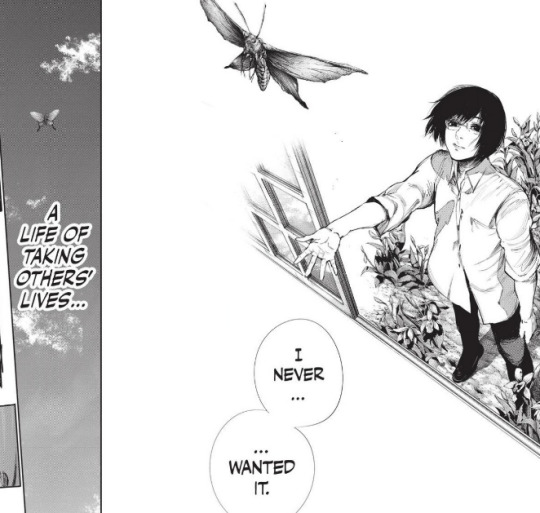
Arima loathes violence, he loathes being an investigator, he loathes himself most of all and designs his entire political revolution around him finally being killed by Kaneki - to punish himself and also to relieve himself of the burden of living a life where he was only meat to kill others.
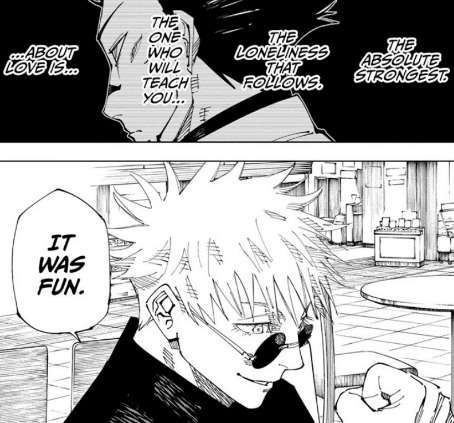
Gojo on the other hand loves being the strongest, he lives for Jujutsu. Arima's death is tragic and nihilistic believing his life had no real worth because all he ever was was a weapon to hurt others, whereas Gojo died satisfied.
Arima's last battle against Kaneki is grim, silent, and tragic, he does everything he can to make Kaneki despise him, to force Kaneki to kill him by being the worst version of himself and when Kaneki still wants him to live he just slits his own throat because even if Kaneki forgives him he can't forgive himself. Gojo laughs his head off and has the time of his life fighting against Sukuna, and going out in a blaze of glory.
Gojo dies smiling, Arima dies finally breaking into tears after a life of pretedig to be cold and emotionless. Gojo's dying regret is 1) that Geto wasn't there to say goodbye to him, and 2) that he wasn't able to draw out all of Sukuna's strength. Arima's dying regret was all the pain and suffering he caused throughout his life and how he was never able to rise above his circumstances and be anything other than what he was born to be.
These two characters are incredibly similiar, they are both the strongest, and they were both made into tools by a dehumanizing system they were born into. However, their attitudes are entirely different. Gojo enjoys being strong, and yes part of it is that Gojo himself doesn't realize he's a victim or what society has groomed him into becoming, but the other part is just because it's an ego trip for him. Gojo doesn't see himself as the tragic victim his fandom makes him out to be.
If you were to transplant him into Tokyo Ghoul Gojo would be happily killing ghouls, and he would think killing ghouls is fun because he's the strongest and best at killing ghouls. This is the complexity that is Satoru Gojo, he has been dehumanized and put on a pedestal his ow life, but Gojo also enjoys being on that pedestal and won't ever step down from it willingly.
I'm not saying that Arima is a better person than Gojo. I think the fact that Gojo doesn't think of himself as a victim is tragic in its own right, because he lacks the self-awareness to actually grow and change as a person. In the end both Arima and Gojo believe they couldn't be anything better than what they were, and their only release is death which is just insanely sad to me because as long as the future exists people always have a chance to get better no matter who they are. To give up on the future, to see an early death as a good thing simply because you can't endure life any longer is one of the most hopeless things imaginable.
Gojo's not sad because he was born to be a tool exploited for society's benefit, he's sad because he was lonely. He doesn't even realize it's his own darn fault he's lonely, because not only has Shoko said that he's not alone she's always been right there, but this chapter we get a repeat of Gojo's students begging him to let them in and Gojo himself decided to draw that line between himself and others and thinking an enlightened, godlike being like himself can't possibly be understood.

All of this to say I think Gojo is the sole victim here, but he's the middle of a chain of of victimhood. I think ultimately the biggest victim here is Yuta, and yes I will not only play trauma olympics here I'm going to win.
If this chapter goes to show anything it's that Gojo has completely failed in his ideals of protecting the youth from the dehumanizing system of sorcerers that takes children and reduces them to cogs in a machine.
A lot of people criticize Jujutsu Kaisen for dropping basically all of its political elements and themes of reform in the second half after Shibuya, and while I understand the criticism I think Gege intentionally shifted away from politics because Gojo's political revolution was never going to succeed.
From the beginning Gojo's solution to reforming Jujutsu Society and it's habit of taking away the youth of children and raising them up instead as child soldiers is... to make stronger child soldiers.
This is Gojo's blindspot and it has always been Gojo's blindspot.

It's why Gojo is completely okay with someone like Mei Mei who at the best uses her brother as a human shield to get out of curse domains and has stolen his entire childhood away to make him own pet little shoulder, and at worst actively molests him.
It's why Gojo is stated in the databooks to have only taken an interest in Megumi and Yuta because they were strong.

Gojo understands that he's being exploited by Jujutsu Society, but doesn't understand you need to deconstruct unfair systems of power and exploitation in order to build something better. Gojo from the beginning only had one plan, and that was to replace the people at the top with his own allies who'd support his agenda. He just thought waiting for them to die out and the children to grow up was the more peaceful way of doing it.
Gojo's political revolution was doomed from the beginning and that's why we see him go back on his word this chapter and just slaughter everyone at the top. His choice of a new leader for Jujutsu Society is hardly better than the elders, the person who executed Gojo's teacher and tried to get all the children to kill Itadori early on. Good choice.
This is what Gojo said would happen though, if he just wiped everyone out at the top no real systemic change would occur because they'd just be replaced with someone who wasn't that differet. Gojo's just given up on the notion of lasting change out of pragmatism.

Which is why Gojo himself is not that different from the elders in the first place, not because he's a bad person but because he was shaped by that same society and he's the pinnacle of that society.
I think the thing is and this point often gets ignored - a lot of the choices the elders make are because of outdated traditions like choosing to oppress Maki and Toji just because they challenge the traditional notions of cursed energy.
However, some of the decisions they make are out of cold hard pragmatism. Gakuganji actually turned out to be right in his assassiation attempt against Yuji Itadori. If they had succesfully killed Yuji, then the massacre in Shibuya would have been prevented and likely Kenjaku's plans would have been pushed back. The elders didn't sentence Yuta to execution just to be cruel, or just because they're superstitious but because he's already had several incidents of nearly killing people because he can't control Rika.
It's easy to dismiss the Elders as evil because they're just faceless entities, but then we witness in this very same chapter the main characters making the same heartless decisions out of the same sense of pragmatism.
Gojo understands Jujutsu Society is flawed, but doesn't understand exactly why it's wrong. He doesn't raise his students to be independent free thinkers because then they might question him, he raises them to be very powerful because that's more pragmatic.
Here are the next generation of sorcerers who are going to bring about the change to Jujutsu Society that Gojo so desperately seeks.
Nobara Kugisaki: Dead
Hakari Kinji: His greatest ambition is to start a fight club
Yuji: Actively calls himself a mindless cog and just wants to kill whatever society points him at and tells him to kill.
Maki: Mass murderer.
Yuta: Just stole Gojo's body and said he had to become a monster i Gojo's place.
Megumi: Begging to be killed.
Inumaki: Tuna Mayo
Panda: Is a Panda
(Joke lovingly ripped off from @kaibutsushidousha)
I understand that fighting Sukuna takes precedence now, but do you think once the dust settles any of these characters are going to do anything to make lasting change?
Are we going to see anything for them at the end of the road other than a mountain of their fellow sorcerers corpses?
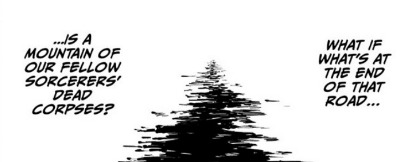
Gojo didn't nurture his students to grow into healthy adults, he raised them into stronger child soldiers and yes that's the pragmatic thing to do to help them survive in the Jujutsu World, but the elders make those decisions out of cold pragmatism as well.
MHA is also showing a story where the children are failing to learn from the previous generatio's mistakes, but it's far less frustrating to watch in JJK because it almost seems like that's the point?
Maki sacrificed Mai for the sake of becoming someone strong enough to reform the Zen'in Clan, only for her sister to die and Maki to slaughter the rest of her family failing in both her goals to reform her clan and protect Mai.
Yuji became the host of Sukuna in order to help others, because the total deaths of people in the world would go down if he ate all the fingers. Not only did that decision lead to the death of thousands in Shibuya, but he's even lost his role of being Sukuna's host to Megumi.
Yuta wanted to find a reason to live and a purpose in protecting his friends, and also wanted to pay back the man who saved him, not only is Yuta choosing to die in a way that breaks his friends heart he's also violating his beloved teacher's bodies.
There's a lot of arcs like this where characters fail in what they set out to accomplish, because like in most tragedies they don't try to grow as people they only care about getting stronger. It's the same choice over ad over again, a decision made of cold pragmatism that brings about their tragic ending.
I think it speaks to why systems like this perpetuate themselves, because it becomes so hard to hold onto your humanity that even trying gets you actively punished all the while people like Mei Mei crawl to the top. However, even if you throw your humanity away purely as an act of survival you're still helping perpetuate that system instead of fighting against it.
Anyway, that's enough hating on Gojo, onto the main event.
THE NEXT GOJO SATORU.
It's almost masterful how perfect the foreshadowing for this chapter's twist was. Yuta sharing a common ancestor in Sugawara with Gojo.
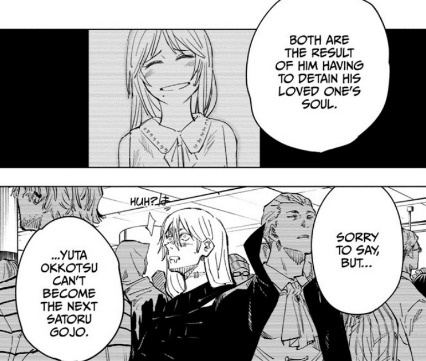
The irony that Kenjaku said out loud that someone like Yuta could never become Gojo, on top of the fact that Yuta's true power comes from detaining his loved ones soul. He's turning Gojo's body into a weapon the same way that he once used Rika's vengeful cursed spirit as one (he even channels her strength into a sword, the same way Maki uses the sword that Mai gave her life to create in battle).
The way that Yuji's first impression of Yuta from his powerful presence and cursed energy alone was calling him someone even creepier than Gojo.
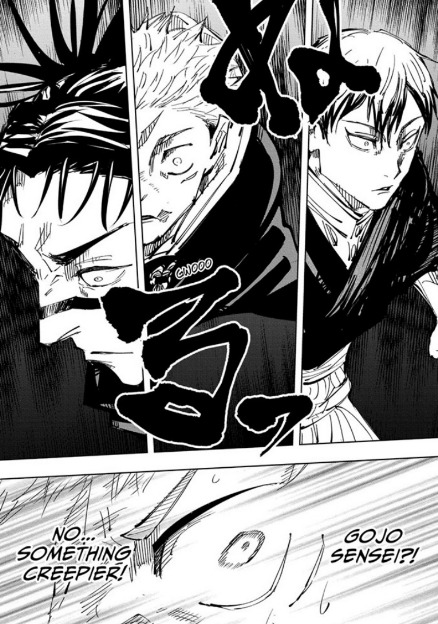
The idea that Kenjaku has been trying to get his hands on the six-eyes for years, which is what led most of the fandom to theorize a possible Kenjaku return by stealing Gojo's corpse. The fact Tengen said the six eyes, himself and the star plasma vessel are all connected and one time Kenjaku killed the six-eyes from a child only for another one to appear right away.
Yuta being told he could never reach Sukuna's heights because he lacks the selfishness of a calamity.
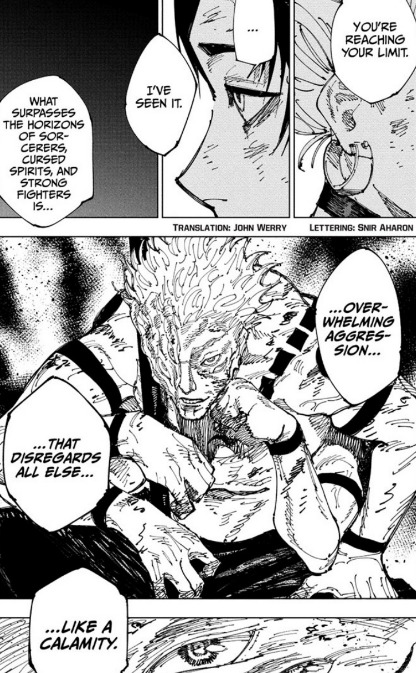
Even Yuta trying to tell a nameless assassin Uro to be less selfish, only to be chastised by her for not understanding because it's impossible for someone as blessed as he is to know what it's like to not have a name, to not have a face, to not be someone important.
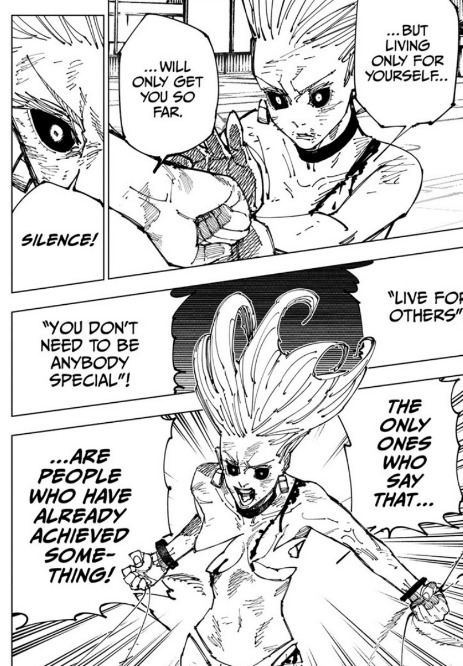
Now here Yuta is, not only is he making the selfish decision to use his teacher's body as a tool, he's also most likely in five minutes going to die in someone else's body, having sacrificed not only his name, and face, but also his personal values in order to become a monster.
This arc makes it seem like Yuta's gone against everything he's stood for, making his arc a complete circle from Jujutsu Kaisen Zero and that's kind of the point. Heck, even something as small as Yuta's decision to show mercy to Ishigori was rendered pointless because Sukuna immediately killed him soon after taking Megumi's body.
If Yuta's regressed in his character it's because Gojo's purpose was not to raise these children into healthy adults, but strong soldiers.
What happened to Yuta is a direct consequence of the way Gojo recruits these children, and the underhanded motivations he has behind those recruitments.
Yuta's decision to take Gojo's body is more tragic on Yuta's part then it is on Gojo's, because Yuta is a child, and Gojo is an adult.
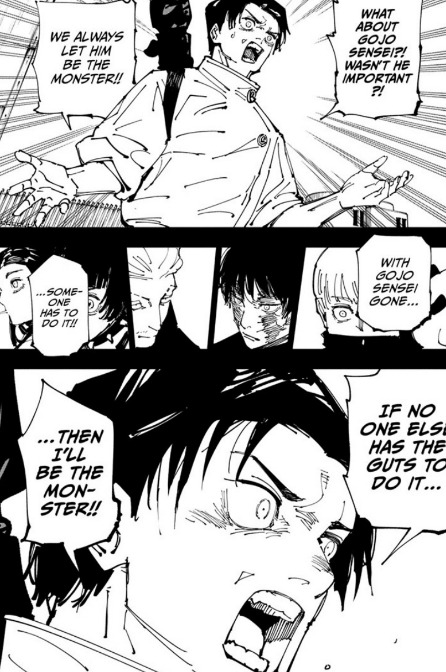
It is sad that Gojo is all alone, that he's forced to become a tool to society, but Yuta shouldn't be the one who feels responsible for that. Gojo is supposed to protect Yuta, he's the adult, the teacher, the one with power and Yuta is the child. Yuta is not the one who should be making this speech because it is not Yuta's responsibility to do any of this - but Yuta thinks it is because he owes Gojo.
However, when Gojo recruits people it's with the unspoken implication that they now owe him. He wants them to feel indebted, because then they'll be easier to use as pieces in his intended political revolution. We see this blatantly with the way he recruited Megumi.

I'll make sure you and your sister don't starve but you owe me in the form of labor later on in your life.
Gojo saved Yuta because he thought Rika was powerful and the elders were foolish for executing a potentially powerful sorcerer for THE GREATER GOOD instead of teaching him to control his power out of fear. Gojo recruited Yuji, because someone with Sukuna's power and who could eat his fingers as a vessel had the makings to be an incredibly powerful sorcerer. Gojo didn't even think of Megumi until after Geto defected, and Gojo decided he needed to start making changes to Jujutsu Society.
While Gojo's pragmatism is understandable to a point it also poisons his more nobler intentions. Since Gojo expects payment in return when he sticks his neck out for people, because these children are assets first and children secod.
I think Gojo likes Yuta. I think he gets along with him well. Yuta clearly respects him as a mentor. He did in fact go to great lengths to save Yuta from execution. He was right that it was more ethical to teach Yuta to control his powers rather than execute him for the danger he might represet. He even gives Yuta emotional advice a couple of times.
However, if Yuta was just like a grade 4 sorcerer with no special talent I doubt Gojo would have blinked at his execution. He sees Yuta for his talent first, and his potential to become someone like him. If anythig there are clear comparisons to both Megumi and Yuta. They're both prodigies born with incredible techniques, but Yuta is a lot more receptive to Gojo's grooming than Megumi is who's too traumatized to function. Gojo's not just grooming Yuta into being a powerful sorcerer, but another version of himself.
So it's almost karmic that not only does Yuta basically turn his back on everything that makes Yuta himself (his love for people, his desire to live and be surrounded by others), he also does so by literally becoming Satoru Gojo and transplanting his brain into Gojo's body.
Because Yuta is despite possessing a similiar level of talent as far from Gojo as possible. Gojo is not well liked by his comrades, he's there because he's needed due to his power. Yuta on the other hand has everyone vehemently disagreeing with his backup plan in the event of Gojo's death because they don't want to lose him.
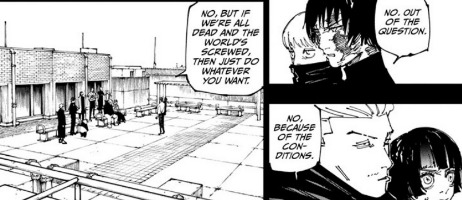
People need Gojo, they want Yuta because of the connections that Yuta has made with them and because they care about Yuta as a person. Gojo is someone who deliberately draws a line between himself and others because he believes the strongest can't be comprehended, Yuta only fights for the sake of being accepted by others because he needs their approval in order to live.
Yuta's now turned his back on those two things, his tendency to put his loved ones first, and his desire to live, both because he feels he owes Gojo.
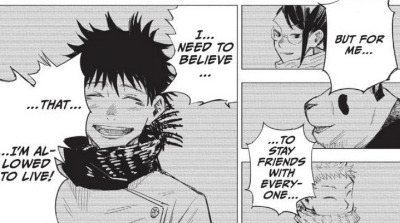
This comes about because of two factors, number one Gojo helping him with the implication that this help means that Yuta owes him something which makes Yuta desperate to pay him back and therfore easy to mold, and number two Gojo's intentions to begin with to take Yuta and make another Gojo out of him. To make a successor who would carry on the same burdens that Gojo did.
Gojo succeeded one hundred percent in making his successor as opposed to Megumi who turned out to be too different from Gojo i the end. He took what make Yuta unique and ironed out all those wrinkles until he was left with someone willing to make the same inhumane, pragmatic decisions that Gojo was.
I think it's tragic that as much as Gojo wanted to make things better for the next generation, he basically led Yuta down the same road he did, to make the same choice to throw his humanity away along with all of his loved ones. Especially since Yuta started out in such a different place.
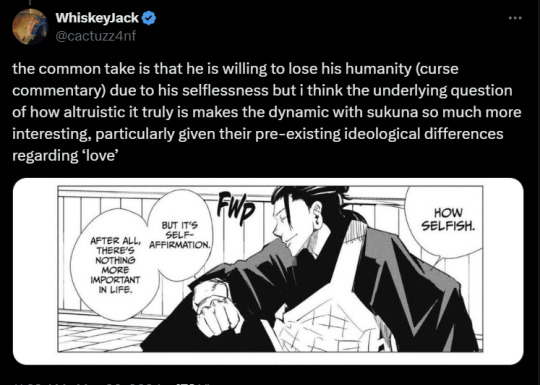
Yuta has learned to become selfish like Gojo, because selfishness is apparently now the only way to get by in this world. A cycle that has been started with the elders, and continued on with Gojo, remains unbroken as Yuta becomes just another link in the chain. Yuta's likely going to die in a stranger's body, leaving all of his friends behind to mourn him, but even if he lives what life will that be exactly?

It speaks to the arcs in Jujutsu Kaisen that they're all kind of circles at this point. We have this heartwarming goodbye of Rika telling Yuta to live, and Yuta's whole arc was to learn to try to live without Rika and make new friends, but it's now likely goig to end with Yuta dying a year after Rika finally moved on.
Choso was told to try living on as a human and Yuki even sacrificed her life to give him the opportuity to escape the fight, and he only lived a month longer to die right in front of Yuji's eyes.
Gojo put all of his hope in the next generation, but now not only did he put all the power in Gakuganji's hands but he ended up dying a year after Geto did just like Yuta will likely die a year after Rika.
I think these character arcs are turning out to be circles because the characters aren't actually doing anything to try to break the cycles that they're trapped inside of - they're only trying to get stronger. Which is why they end up resembling the actions of the villains, Yuji becoming more curselike, Yuta stealing Gojo's body the way Kenjaku did with Geto's.
It reminds me of a quote from Critical Role that I absolutely adore.
“I have just taken an audience with the Raven Queen who has snuffed any hope of my redemption, for which I am truly grateful. With new clarity, I can finally see my life as a series of compounding, poor choices.” Vax winces. “There was nothing I could’ve done to save my family, yet I still sold my soul in search of vengeance. Later I allowed Ripley to leave, knowing full well she was a greater threat to the world than the Briarwoods would ever be. I traded the world’s safety for the belief that I could murder my way to peace; that if I could be a greater horror, it would bring my family back. And once this lie was shattered I scrambled to find asolution, to make a deal, to undo my mistakes and balance the scales. I nowunderstand that there are no scales, there is no redemption, and no ledger that judges me good or evil. I am free to simply be myself and live with the terrible mistakes I’ve made."
Especially this sentence: I believed I could murder my way to peace; that if I could be a greater horror, it would bring my family back.
Maki is a character that I have not found all that interesting in a while because she committed such a huge mass murder, only for it to have no consequences in the narrative and never be mentioned again, but this chapter she suddenly became an interesting character again.
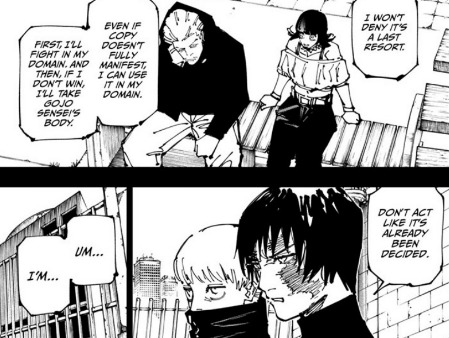
Maki who lost everything but gained strength, doesn't seem all that bothered by the loss. People compare Megumi's reaction to losing Tsumiki to Maki's reaction to losing Mai, but Megumi's reaction is much more interesting because it's always better to see a character be weak and fall apart then to be strong and power through things.
However, maybe the reason Maki hasn't experienced any grief at all towards Mai and has instead delighted in her newfound strength and independence is because of this, because she still had Yuta.
Maki is a character who's not really said anything other than exposition the past like twenty chapters, but now she's the most vocally against Yuta sacrificing himself for the greater good. Yet this is against Maki's own ideology of doing everything you can to be stronger, to win. Maki was always about individualism, not about friendship or the bonds between others, she severed her own bonds to be free. Yet, she can't stand to see Yuta do the same thing as her, to become more like her.
This might be the consequence of Maki's continued choice to value freedom and the power to achieve that freedom over all else. Now, the one time Yuta is trying to throw away the same things that she threw away she can't say anything meaningful or convince him to stop him.
Which reminds painfully of this chapter as well.
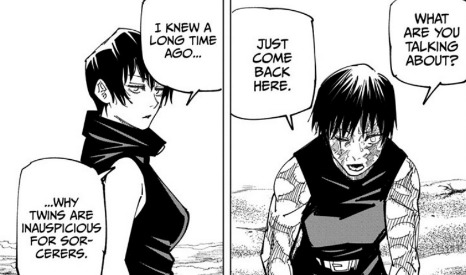
Mai killing herself in order to free Maki from cursed energy is an obvious parallel to Sukuna devouring his own twin in the womb, but the difference is in this situation Maki didn't want Mai to go, she begged her not to. However, just like with Yuta there was nothing Maki could ahve said or done by that point to convince Mai to stay. Maki has always chosen power over her sister, she's always abandoned Mai, so what exactly can she say to convince her that she cares more about Mai more? That her dream of defeating the Zen'in and having revenge against them isn't worth the price if it comes at the sacrifice of Mai?
Maki didn't want to abandon Mai, or for Mai to sacrifice herself, but tragically her every action indicated otherwise. It all comes down to this: I believed I could murder my way to peace; that if I could be a greater horror, it would bring my family back.
Maki seems to have achieved peace by murdering the Zen'in, but we see the same kind of circular arc that we have for Yuta.
Maki gave up on everything for strength, but Maki's not strong enough to finish Sukuna then and there, forcing Yuta to sacrifice himself the same way Mai did.
Maki can't talk Yuta out of making that sacrifice, or come up with any convincing argument with why he shouldn't because of all the choices she's made before this.
Maki chose to murder her way to peace, but it came at the cost of her humanity and growth and thus she's faced again with the exact same situation with Mai and she's forced to watch her heart be taken from her again.

It goes to show that we think these characters are getting stronger but they're actually sacrificing something vitally important.
These characters are just going to keep going around in circles and you have to wonder just when is it going to stop?
647 notes
·
View notes
Text
My Hero Academia Ch. 425 Thoughts
To tell you the truth, I'm relieved. When I saw how the fight with Tenko/AFO ended, I was immensely disappointed.
I felt like we were going to smash cut to the final chapter, everyone in the LOV would be dead, and we'd get some smarmy shot of Deku clenching his fist and staring at the sky saying, "But someday, we'll fix these problems. Someday, somehow, this will be our Hero Academia." For me, that would have been the worst outcome possible. Like it'd make me depressed.
Seeing that we're probably going to get an actual mini-story arc to wrap things up is so important to me. And to be honest, I'm much more fascinated by the potential of this last little leg of the story than I was with most of the war arc.
This is something I've never really seen a Shonen do, follow up the big final slugfest with a stretch of story that's marked by so much uncertainty, less action and more focus on drama, suspense, and emotional content. I'm in a position where I don't know what the story's going to throw at me, and that has me excited. Especially with Horikoshi acknowledging that this set of circumstances can't be neatly tied off in just a quick batch of two or three chapters.
As for what's actually in the chapter, I love how even the gags have this morose tinge to them. Like everyone's trying to crack jokes or goof off in order to cope with the pain. Seeing Fuwa again was also really nice, since I love her design and personality so much. I think she's the kind of upperclassman the 2-A gang need right now - cheerful, laidback, but experienced and confident, too.
Getting to that reveal towards the end, I think the person with the dark hair is actually Toga transformed into another patient. I get the feeling she's trying to escape the hospital, and that gives me a lot to think about. She was sure she'd be killed if she was caught, so is she being taken care of? Or is she being mistreated? I've heard horror stories about mental health institutions even for patients without a criminal record. I wonder if Horikoshi is going to do something so dark as to show Toga being abused and Ochako needing to rescue her from that situation.
I also think it's pretty clear that at the very end, Endeavor is sitting in front of Touya inside some sort of regeneration tank like from DBZ. He's probably going to be in there for years, and it's probably going to cost the Todoroki family a fortune to keep him alive.
Overall, I think this is good. Really, really good, so long as Horikoshi takes a little more time to really deliver. Have the students confront the system head on and save the people who still need them. I hope after his break, we see Horikoshi really give the story the finale that it needs the most.
#boku no hero academia#my hero academia#toga himiko#mawata fuwa#touya todoroki#kohei horikoshi#mha spoilers#bnha spoilers#bnha 425#mha 425
32 notes
·
View notes
Text
Thinking About the Itadori Family
Spoilers for Jujutsu Kaisen. Reader beware, you're in for a scare!
I find Kenjaku a fascinating character in a lot of different ways. There's always a game being played and a lie being told, and yet there's still this damp, flickering spark of humanity under all the theatrics, bullshit, and centuries of accumulated junk.
When Kenjaku escorted Itadori's former classmate from aeons ago back in chapter one out of the Sendai Colony, there was this really interesting softness they display nowhere else. Gone is all the pretense of mocking others and keeping secrets... perhaps because they knew most of it would be forgotten, as dreams often are. But it seems like Kenjaku may have given away some deep insight into the nature of sorcery by casually mentioning the "Cursed Realm" - which has never, to my knowledge, been mentioned before or since. Not only that, but Kenjaku tells her something truly shocking:
"Thank you for getting along with my son."
Like, you can see how weird this is, right? Face to face with Yuji, Kenjaku says, "I expect great things from you." Talking with Choso while Yuji isn't in the room, Kenjaku talks about him like some object; a mere vessel, the eye of the storm for the age to come. Talking with a non-sorcerer teenage girl who's unlikely to remember much, if any of the conversation, Kenjaku accepts Yuji as their son and expresses gratitude that she was kind to him.
So, is this a "Who we are in the dark" moment of honesty? Is this the consequence of Kenjaku being a composite of all these different personalities bubbling to the surface at different times? It's really, really hard to say. But I like the idea that somewhere at the bottom of it all, there is genuine love, if misguided in its expression. That's what I want to run with.
Personally, I've seen theories that Kenjaku duped Jin, or somehow used sorcery to enthrall him, or that Jin simply went insane before or after Kaori died and wasn't in his right mind. I think those are all possible, and they're more straightforward answers. But I want to get off the road and into the woods and see where I end up.
What if Jin knew? What if a pact was made to try to bring Kaori back, and even when the person who came back wasn't Kaori, Jin was still grateful? What if Jin was just grateful to get to see Kaori smile one last time, to get to hear her voice one last time, even if he knew in his heart it couldn't be the same ever again? Just like when Yaga brought Takeru back as a cursed corpse for Kusakabe's sister, so she could hear her son's voice and hug some part of him one last time.
And what if genuine love grew out of that gratitude? What if seeing this acceptance and kindness in Jin, of having someone give gratitude and a wish to be by Kenjaku's side, started to morph and change who Kenjaku was without them realizing the full ramifications of that at first?
What if that ache for a family, for a place to belong, for some connection to other human beings, has carved itself open inside this nomad of flesh and time? Journeying across a thousand years and potentially dozens of bodies, duping themselves into thinking they only cared about their grand experiment, only to narrowly dodge getting ensnared by their human heart and spending all this time since then trying to ignore their own humanity?
I still have a feeling Kenjaku isn't quite dead yet, and I want to believe a change that was started by Jin will have been finished by Takaba. With Kenjaku realizing they do want other people, that they do want to see human potential, not the potential of this mad experiment. And that they'll now be gunning to change the outcome of the Merger, in whatever way is possible.
Though I think this is probably just me spinning my own theories out into something that doesn't even resemble GeGe's plan. But hey! Each theory I make that's proven untrue by the author is an idea I can use in my own writing for free.
#jujutsu kaisen#jujutsu kaisen theory#jujutsu kaisen thoughts#kenjaku#itadori jin#jjk spoilers#jujutsu kaisen spoilers
23 notes
·
View notes
